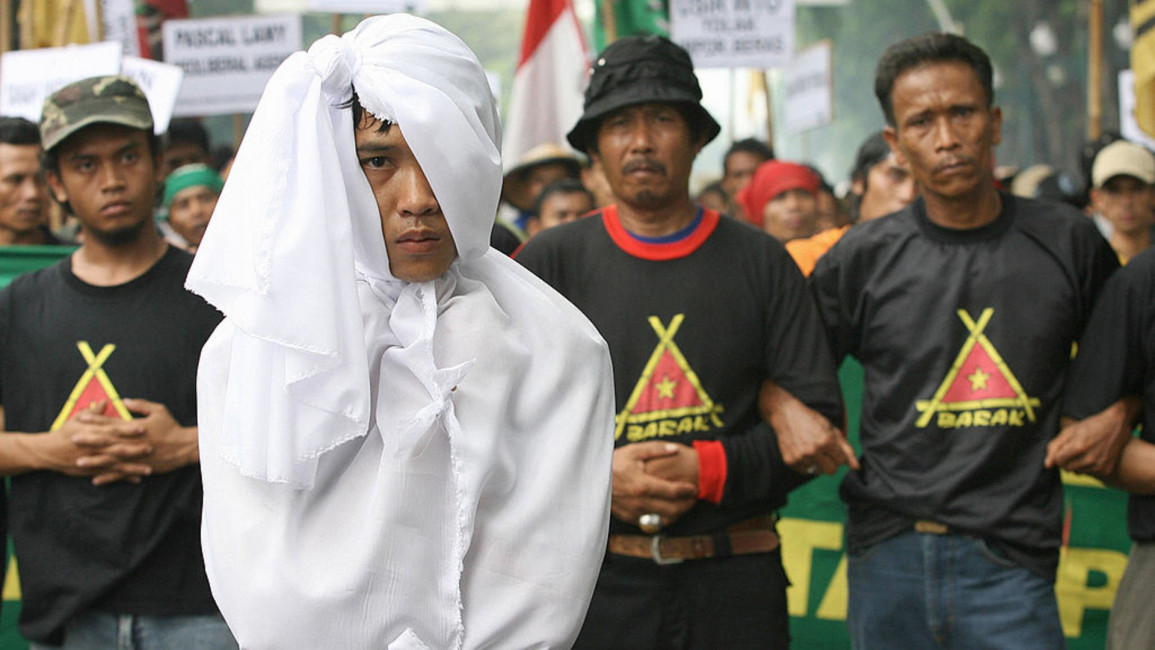Indonesia village uses ghosts to spook locals into coronavirus lockdown
Indonesia village uses ghosts to spook locals into coronavirus lockdown
Indonesia is taking coronavirus curfew measures to a whole new level.
2 min read
Pocong are ghosts dressed in white shrouds [Getty-file photo]
Activists in one Indonesian village have found a novel way to enforce a semi-official coronavirus lockdown.
Taking advantage of widespread fears about ghosts, volunteers have deployed spirits to haunt the streets of a superstitious village on Java island, Reuters has reported.
The small army of ghosts have been largely successful in keeping villagers indoors, as local authorities encourage citizens to practice social distancing to curb the spread of Covid-19.
The white shrouded figures are known to pounce on unsuspecting villagers who break the nightime curfew in Kepuh.
Despite fears about the recent sightings of ghostly apparitions, the figures are anything but supernatural.
"We wanted to be different and create a deterrent effect because 'pocong' are spooky and scary," Anjar Pancaningtyas told the news agency.
The pocong are a type of ghost who don white shrouds. It is a look replicated by members of the youth group in Kepuh, as they try and keep people off the street for their own safety.
The plan comes after a spike of Covid-19 cases in the country, with many blaming inaction by the government for the epidemic.
Indonesia has seen 4,457 reported cases of coronavirus with 399 deaths, but medical experts fear as many as 140,000 people could die from the disease by May unless stricter measures are put in place.
The lack of urgency from authorities to act appears to have endowed much of the population with a sense of complacency about the disease.
"Residents still lack awareness about how to curb the spread of Covid-19 disease," a village leader told Reuters.
"They want to live like normal so it is very difficult for them to follow the instruction to stay at home."
Volunteers in Kepuh now take turns to dress as the spirits and wander the streets enforcing the local lockdown. So far, it seems to be working.
"Since the pocong appeared, parents and children have not left their homes," a resident told the news agency.
"And people will not gather or stay on the streets after evening prayers."
Taking advantage of widespread fears about ghosts, volunteers have deployed spirits to haunt the streets of a superstitious village on Java island, Reuters has reported.
The small army of ghosts have been largely successful in keeping villagers indoors, as local authorities encourage citizens to practice social distancing to curb the spread of Covid-19.
The white shrouded figures are known to pounce on unsuspecting villagers who break the nightime curfew in Kepuh.
Despite fears about the recent sightings of ghostly apparitions, the figures are anything but supernatural.
"We wanted to be different and create a deterrent effect because 'pocong' are spooky and scary," Anjar Pancaningtyas told the news agency.
|
|
The pocong are a type of ghost who don white shrouds. It is a look replicated by members of the youth group in Kepuh, as they try and keep people off the street for their own safety.
The plan comes after a spike of Covid-19 cases in the country, with many blaming inaction by the government for the epidemic.
Indonesia has seen 4,457 reported cases of coronavirus with 399 deaths, but medical experts fear as many as 140,000 people could die from the disease by May unless stricter measures are put in place.
The lack of urgency from authorities to act appears to have endowed much of the population with a sense of complacency about the disease.
"Residents still lack awareness about how to curb the spread of Covid-19 disease," a village leader told Reuters.
"They want to live like normal so it is very difficult for them to follow the instruction to stay at home."
Volunteers in Kepuh now take turns to dress as the spirits and wander the streets enforcing the local lockdown. So far, it seems to be working.
"Since the pocong appeared, parents and children have not left their homes," a resident told the news agency.
"And people will not gather or stay on the streets after evening prayers."


![President Pezeshkian has denounced Israel's attacks on Lebanon [Getty]](/sites/default/files/styles/image_684x385/public/2173482924.jpeg?h=a5f2f23a&itok=q3evVtko)



 Follow the Middle East's top stories in English at The New Arab on Google News
Follow the Middle East's top stories in English at The New Arab on Google News


